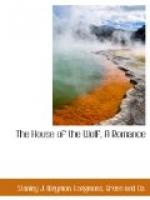It would be impossible to describe the devilish glance he flung at the poor sinking girl as he withdrew, the horrid emphasis he threw into those last words, the covert deadly threat they conveyed to the dullest ears. That he went then, was small mercy. He had done all the evil he could do at present. If his desire had been to leave fear behind him, he had certainly succeeded.
Kit crying softly went into the house; her innocent coquetry more than sufficiently punished already. And we three looked at one another with blank faces, It was clear that we had made a dangerous enemy, and an enemy at our own gates. As the Vidame had said, these were troublous times when things were done to men—ay, and to women and children—which we scarce dare to speak of now. “I wish the Vicomte were here,” Croisette said uneasily after we had discussed several unpleasant contingencies.
“Or even Malines the steward,” I suggested.
“He would not be much good,” replied Croisette.
“And he is at St. Antonin, and will not be back this week. Father Pierre too is at Albi.”
“You do not think,” said Marie, “that he will attack us?”
“Certainly not!” Croisette retorted with contempt. “Even the Vidame would not dare to do that in time of peace. Besides, he has not half a score of men here,” continued the lad, shrewdly, “and counting old Gil and ourselves we have as many. And Pavannes always said that three men could hold the gate at the bottom of the ramp against a score. Oh, he will not try that!”
“Certainly not!” I agreed. And so we crushed Marie. “But for Louis de Pavannes—”
Catherine interrupted me. She came out quickly looking a different person; her face flushed with anger, her tears dried.
“Anne!” she cried, imperiously, “what is the matter down below —will you see?”
I had no difficulty in doing that. All the sounds of town life came up to us on the terrace. Lounging there we could hear the chaffering over the wheat measures in the cloisters of the market-square, the yell of a dog, the voice of a scold, the church bell, the watchman’s cry. I had only to step to the wall to overlook it all. On this summer afternoon the town had been for the most part very quiet. If we had not been engaged in our own affairs we should have taken the alarm before, remarking in the silence the first beginnings of what was now a very respectable tumult. It swelled louder even as we stepped to the wall.
We could see—a bend in the street laying it open—part of the Vidame’s house; the gloomy square hold which had come to him from his mother. His own chateau of Bezers lay far away in Franche Comte, but of late he had shown a preference—Catherine could best account for it, perhaps—for this mean house in Caylus. It was the only house in the town which did not belong to us. It was known as the House of the Wolf, and was a grim stone building surrounding a courtyard. Rows of wolves’ heads carved in stone flanked the windows, whence their bare fangs grinned day and night at the church porch opposite.




